The first Confucius Institute Day was celebrated on Saturday, September 27, in honor of the institute’s 10th anniversary. Undeterred by its recently soured relationship with the University of Chicago, a variety of events were held by its branches all over the world, celebrating its contribution in promoting Chinese culture and strengthening informal connections between China and other countries.
Run by Hanban, an organization with close ties to the Chinese Ministry of Education, the Confucius Institute was started in 2004 as a non-profit organization, and grew rapidly worldwide over the last decade. It has established a presence in 123 countries through 465 Confucius Institutes in universities and 713 Confucius Classrooms in elementary and secondary schools. Fifty-thousand teachers and volunteers have been dispatched abroad, educating millions of people registered at the institutes.
Both President Xi Jingping and Premier Li Keqiang sent congratulatory letters to all Confucius Institutes, recognizing their efforts in Chinese language teaching and cultural exchange, and their role in promoting mutual understanding and communication between Chinese people and citizens of other countries.
Quoting the Chinese philosophy of “harmony without uniformity,” Li wrote in his letter: “I wish that Confucius Institutes will move forward in accordance with the principle of ‘mutual respect, friendly discussion, equality and mutual benefit,’ continue the model of collaboration between educational institutions in China and abroad.”
Previously in the U.S. and Canada, advocacy groups objected to Confucius Institutes allegedly meddling with the internal affairs of partner universities on issues such as hiring decisions.
Last year, The Nation published an article in which Marshal Sahlins, an anthropologist at the University of Chicago, argued that unlike the Goethe-Institut, British Council and the Alliance Français, which are stand-alone organizations, Confucius Institutes intrudes on “university precincts.”
Following the article, a petition to halt partnership with the Confucius Institute was signed by more than 100 professors at the University of Chicago in April.
Last Thursday, two days before the Confucius Institute Day, the University of Chicago announced a suspension of negotiations for another term of cooperation.
The five-year partner of the Confucius Institute did not, however, cite the petition as the reason for the suspension.
The statement went on to say, “recently published comments about the University of Chicago in an article about the director-general of Hanban are incompatible with a continued equal partnership.”
This hinted at a Jiefang Daily interview with the chief executive of the Confucius Institute headquarters, Xu Lin. The Sept 19 article illustrated Xu’s toughness by quoting her one-sentence response to the petition, daring the university to suspend the partnership with the institute.
The interviewer went on to say that Xu’s remarks had upset the University of Chicago.
Still, the incident in Chicago didn’t damper the celebrations on the East Coast. In New York City, five institutes collaborated on a series of events including speakers, discussion panels, performances as well as workshops and art exhibitions, highlighting Chinese culture.
“Dissident voice is very normal in America. Confucius Institute is a matter of collaboration for both parties. We’re not imposing it on anyone,” Chang Quansheng, consul of the Consulate General of the People’s Republic of China in New York, told The Diplomat, dismissing the petition and break-up in Chicago.
Han Zhang covers life and culture for The Diplomat. A graduate of Waseda University, she studied international liberal arts in Tokyo and Boston. Zhang previously wrote for the Bronx Ink and the Japan Times. She is currently a graduate student at Columbia Journalism School.

































